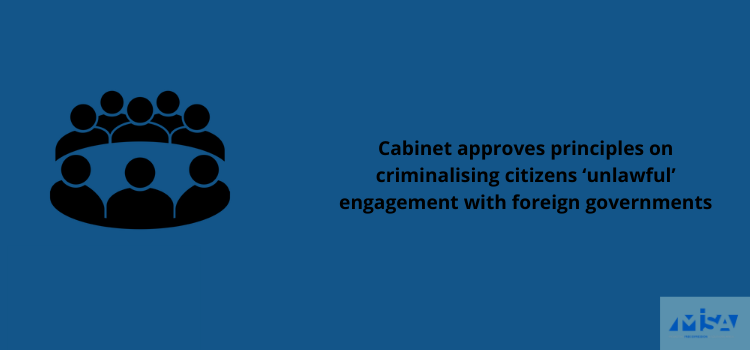The Ministry of Justice Legal and Parliamentary Affairs on 16 November 2021 said Cabinet has approved principles aimed at amending the Criminal Law (Codification and Reform) Act to criminalise citizens’ unauthorized negotiations with foreign governments.
This was disclosed following submissions made by the Ministry’s Law Officer, Policy and Legal Research Department, Ms P. Dhokwani, to the Parliamentary Portfolio Committee on Foreign Affairs and International Trade on the status of the principles of the proposed law to regulate Zimbabwean citizens’ engagement with foreign governments.
In a virtual presentation to the Committee, Ms Dhokwani noted that the principles of the proposed law which is set to amend the Act had been approved by Cabinet and that drafting instructions have since been forwarded to the Attorney-General’s Office.
She said this was being done to incorporate Section 12 of the Constitution which deals with Zimbabwe’s foreign policy.
Section 12 stipulates, among others, that the foreign policy of Zimbabwe must be based on the promotion and protection of the national interest of Zimbabwe and respect for international law.
The proposed law will criminalise, among others, unauthorised private negotiations engaged in by citizens with foreign governments which relates to the country’s foreign relations and policy with other sovereign nations.
MISA position
MISA Zimbabwe notes that this development follows the recent gazetting of the Private Voluntary Organisations Amendment Bill which seemingly seeks to target NGOs that are performing their watchdog role over the three arms of the state which is at the core of citizens’ democratic participation in governance issues and economic development.
These two proposed legislative steps have an ominously chilling effect given their far-reaching impact on the ability of civil society to work freely in Zimbabwe.
While the ministry said the amendments would have no effect on the right to freedom of expression, the proposed law has the potential of instilling fear among citizens thereby limiting their right to free expression.
In essence, the laws seek to curtail and criminalise civil society’s work at an unprecedented scale and level that has not been witnessed before in the history of Zimbabwe.










